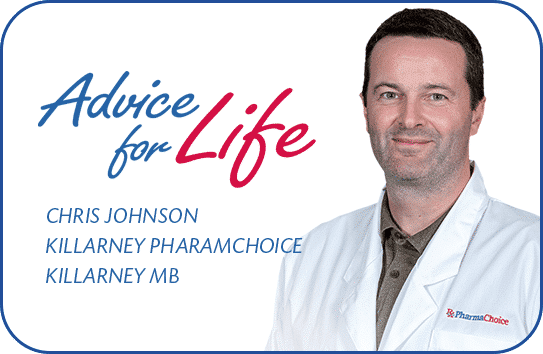Feeling miserable with a cold? Has someone in your family struck down with the cold? You can’t cure the common cold, but when should you seek professional advice?
Symptoms of a cold generally improve after 3 days, but some symptoms such as congestion and coughing may persist much longer. Generally, a cold will resolve within 7 to 10 days.
One symptom that should be treated, is fever. Fever above 39.4°C (104°F) should be lowered and can be done safely with medication that won’t require a prescription. PharmaChoice pharmacists can help select a product best suited to the symptoms you want to treat.
Adult cough and cold medications should not be used for children or infants since serious side effects such as slowed breathing can be harmful. Seek a pharmacist’s advice when choosing medications to treat your family. Prepare to answer questions regarding symptoms, other medical conditions, medications, and treatments you have tried.
Cold treatment should also include proper hydration. Chicken soup, may not cure you, but don’t discount the miracle treatment of warm comfort and hydration.
Seek the advice of a doctor if you experience the following:
- Signs of infection of the ears (pain, children will scratch at their ears)
- Chest pain, wheezing or shortness of breath
- Fever above 39.4°C (104°F) that cannot be lowered
- Fever lasting beyond 5 days or goes away, but returns
- Severe sinus pain, headache or sore throat
- Nasal discharge or sinus pain persisting beyond 10 days
- Cold symptoms do not improve or continue to worsen after 10 days
Children may require a longer time, up to 14 days to recover from a cold. Fever should be treated and monitored regularly. Seek a doctor’s advice if fever is greater than 38.9°C (102°F). For infants less than 3 months old, see a doctor if fever is greater than 38°C (100.4°F). Immediate medical attention should be sought if dehydration is suspected from vomiting, lack of appetite, crying without tears or dry mouth is observed.
Treatment for the elderly and immunocompromised requires tailored consideration. Seek professional advice for their treatment and monitoring.
If you aren’t sure whether you should see a doctor, your PharmaChoice pharmacist is just a phone call away.



